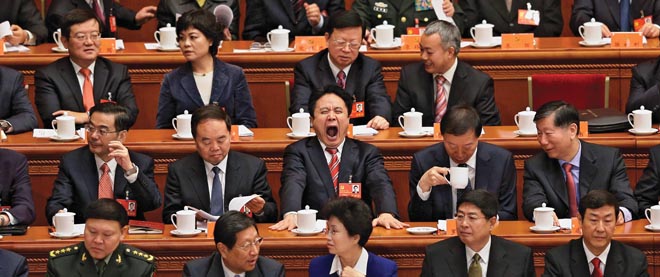Chinese politicians in need of a siesta
The biggest buzz from the Communist Party’s meeting was around the yawns
Delegates sit at the stage before the opening ceremony of 18th National Congress of the Communist Party of China at the Great Hall of the People in Beijing, November 8, 2012. China’s outgoing President Hu Jintao said the nation faced risk and opportunity in equal measure as he formally opened a congress of the ruling Communist Party that will usher in a once-in-a-decade leadership change. REUTERS/Jason Lee (CHINA – Tags: POLITICS TPX IMAGES OF THE DAY)
Share
 Photos of bored Chinese Communist delegates at a pivotal party meeting went viral last week, before quickly disappearing from social media. Yawning party loyalists, after all, don’t fit with the official excitement surrounding Beijing’s once-in-a-decade leadership turnover.
Photos of bored Chinese Communist delegates at a pivotal party meeting went viral last week, before quickly disappearing from social media. Yawning party loyalists, after all, don’t fit with the official excitement surrounding Beijing’s once-in-a-decade leadership turnover.
In fairness, the 18th party congress, which ended Thursday, was hardly heady stuff. Decisions were made months in advance, and the names of the top leadership—including Xi Jinping, who replaces Hu Jintao as head of the Chinese Communist Party—have been known for years. Apparatchiks were just going through the motions.
But that didn’t stop an aura of paranoia from sweeping Beijing. Officials, spooked by falling growth rates, corruption scandals and the children of Communist politicians crashing Ferraris, ramped up security ahead of the handover. The sale of knives was banned in the capital. Buying a toy plane—which could have seditious messages attached to it—required a police chief’s permission. Cabbies were ordered to lock their back windows to prevent passengers from handing out political pamphlets. And in Tiananmen Square, guards carried fire extinguishers to stop Tibetan monks from lighting themselves on fire to protest Chinese rule. Still, in places, dissidents did turn out to protest; scores of them were hauled off by security agents.
Hu, the outgoing president, urged the party faithful to “resolutely not follow Western political systems,” rejecting all talk of reform in his last final address. Depressing stuff, even by Chinese standards. But he also warned that a failure to curb corruption could “cause the collapse of the party and the fall of the state.”
Rumour has it that incoming Premier Li Keqiang is recommending Alexis de Tocqueville—who blamed the French Revolution on unmet expectations—to his friends in office. Among the leadership, there is widespread fear that the simmering rage over the privileges enjoyed by a tiny few could heat up, leading to revolution once more.